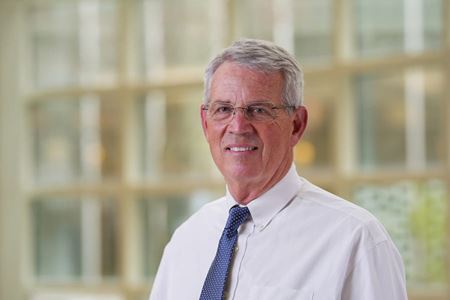When Michael Koch, MD, came to the Indiana University School of Medicine in 1998 to chair its Department of Urology, IU boasted a national reputation as a leader in treating testis cancer and childhood urologic conditions — but was known for little else. IU had experts like the outgoing chair, John Donohue, MD, and Lawrence Einhorn, MD, who together revolutionized the treatment of testicular cancer. But there were no experts in common urologic conditions like prostate enlargement and cancer, kidney stones and female incontinence.
“The biggest problem was in teaching and education — the residents weren’t getting the full breadth of training,” Koch said. “They would go into practice and know how to do this rare surgical procedure (for testis cancer), but they weren’t trained how to take a prostate out, which is much more common.”
Although IU may have the oldest urology department in the nation, with roots dating back to the 1880s, there were just seven faculty members in urology at the time of Koch’s arrival. Over the course of his 26 years as chair, that number has grown to 32. Today, the Department of Urology at IU is among the largest in the nation, offering comprehensive expertise in the field.
“During Dr. Koch's time as chair, he has been instrumental in furthering the size and prestige of the Department of Urology, quadrupling the size of the faculty, and facilitating the department's rise to one of the highest ranked programs at Indiana University School of Medicine,” said Dean Jay L. Hess, MD, PhD, MHSA.
Research funding has increased tremendously during Koch’s time as chair. IU’s urology department now ranks 11th among publicly funded institutions and 21st nationally for NIH-funded research, according to the most recent Blue Ridge Institute for Medical Research listings. Many patients are eligible for clinical trials run through the urology department and the IU Melvin and Bren Simon Comprehensive Cancer Center, giving them access to innovative technologies and treatments.
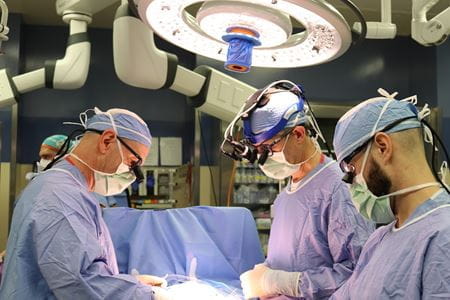
IU’s urology faculty provide services at all IU Health metropolitan Indianapolis facilities and at the Richard L. Roudebush VA Medical Center. They also travel to 17 outpatient locations throughout Indiana. Last year, IU Health urologists saw over 70,000 patients, including 20,000 new patients across the state.
IU’s pediatric urology program is consistently ranked in the top 3 nationally by U.S. News and World Report.
“We now have every subspeciality in urology covered by experts in the field — that’s a big deal,” said Chandru Sundaram, MD, who leads the Urology Residency and the department’s fellowship in minimally invasive surgery. “Dr. Koch has truly made Indiana University a one-stop shop for anything in urology.”
An expert surgeon and educator
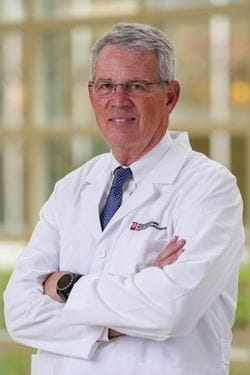
Koch will retire as department chair later this year but will remain on faculty as a clinical educator, training new urologists to perform complex surgeries.
“He is an expert surgeon and an equally good surgical teacher,” Sundaram said. “The operating room is his classroom, where he achieves exceptional patient outcomes while ensuring top-notch training of residents and fellows. It’s rare to see this combination. A lot of chairs rarely operate.”
Koch has authored over 250 publications and has been recognized by the American Urological Association and other national organizations for his contributions to the field. He is an expert in robotic surgery and performs over 200 robotic prostatectomies a year. Koch helped pioneer the use of high intensity focused ultrasound (HIFU) for prostate cancer, for which he received a Health Care Heroes Award from the Indianapolis Business Journal in 2017.
He shrugs off the accolades and prefers to talk about the many departmental successes his team has experienced over the years. Many of IU’s urology faculty serve in leadership positions nationally and have received highest honors in their fields.
IU is recognized nationally for excellence in urology education, offering a high volume of major urologic surgeries. In the most recent survey of American medical residents conducted by the ACGME, the national accrediting body for graduate medical education, 96% percent of IU’s urology residents reported a positive opinion of the program — well above the national average.
“We’re hard on our residents — we work their butts off,” Koch said. “They go out and all have incredibly successful practices, and they are leaders in their communities. They’re super well trained.”
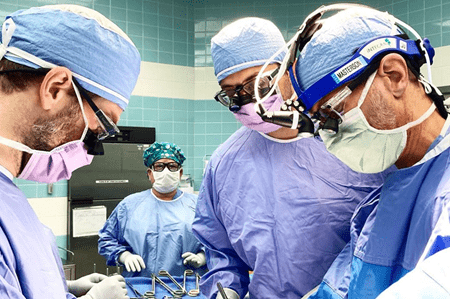 Beyond residency, the department offers six subspeciality fellowship programs.
Beyond residency, the department offers six subspeciality fellowship programs.
Kevin Rice, MD, completed a fellowship in urologic oncology at IU in 2013 during his time as an active-duty surgeon in the U.S. Army.
“IU was my first choice because it provided the best surgical training in urologic oncology in the world,” he said. “My former mentor at Walter Reed Army Medical Center, the late Col. David McLeod, had been in academic urology since 1965. He told me that I would be crazy to go anywhere else.”
After Rice, the Army sent three more urologic oncology fellows to train at IU, including Maj. James McFadden, MD, who completed his fellowship in June before returning to Brooke Army Medical Center in San Antonio, Texas. Rice is now on faculty with the Department of Urology at IU School of Medicine, working alongside Koch and other colleagues whom he considers “lifelong friends.”
“It is hard to narrow down what I admire most about Dr. Koch,” Rice said. “Professionally, I admire his unflappable composure. Whether it is in the stress of a difficult operating room case or a charged interaction in a meeting, Dr. Koch remains calm and focused on solving the problem. Personally, I admire how empathetic he is to his colleagues, his employees, his patients and his friends. Much of what he does for people goes completely unsung.”
A vision for growing the mission
The urology department has seen little turnover under Koch’s leadership. Several faculty, including Sundaram, have stayed at IU for more than two decades, seeing no reason to leave such an innovative and collegial environment.
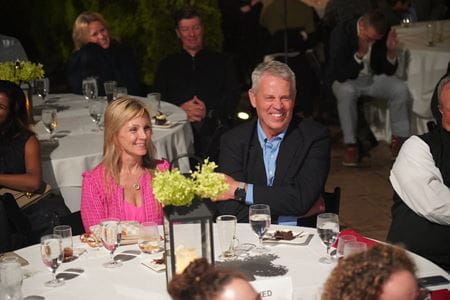 “Dr. Koch is not only a leader, but he is also a good doctor, a teacher, a friend, a mentor and just a good guy,” Sundaram said. “He is the primary reason for me staying here for over 22 years.”
“Dr. Koch is not only a leader, but he is also a good doctor, a teacher, a friend, a mentor and just a good guy,” Sundaram said. “He is the primary reason for me staying here for over 22 years.”
In 2023, Sundaram hosted a well-attended celebration at his home to commemorate Koch’s 25th anniversary as the department’s leader. In a toast he gave that night, Richard Rink, MD, told Koch, “Look around you at the talent in this room you have amassed — it’s amazing.”
Rink is a nationally recognized pediatric urologist who joined the IU School of Medicine faculty in 1985 and has witnessed the department’s tremendous growth.
“IU has always had great urology,” Rink said. “But it has exploded under Dr. Koch’s leadership. He had a vision for what our department could be.”
When Koch became the department’s fifth chair in 1998, Rink said he “almost felt sorry for” him — because Koch was following an “Indiana legend” like Donohue, who was world-renowned for developing new surgical techniques to treat testicular cancer. In tandem with a combination chemotherapy treatment developed by Einhorn, IU urologists played a key role in increasing the survival rate for testis cancer from a dismal 5% to the 95% it is today.
 While Donohue left big shoes to fill, Koch brought his own pair — a different style but just as effective. Koch led the department through a major business model reconstruction and an expansion of services, making it the only statewide urology practice in Indiana.
While Donohue left big shoes to fill, Koch brought his own pair — a different style but just as effective. Koch led the department through a major business model reconstruction and an expansion of services, making it the only statewide urology practice in Indiana.
“(IU urology) is considered one of the outstanding surgical programs in the country and world, with trusted outcomes and long-term databases on some of the most difficult problems to manage in adult and pediatric urology,” said Mark Cain, MD, who joined the faculty in 1996 and is now surgeon-in-chief at Riley Children’s Health.
Rosalia Misseri, MD, the division chief for pediatric urology, credits Koch with “fostering an environment where innovation and rigorous academic pursuit thrive.”
“Dr. Koch is renowned for his unwavering support and dedication to his colleagues and students,” Misseri said. “Under his leadership, the department has flourished, producing exceptional clinicians, academicians and researchers.”
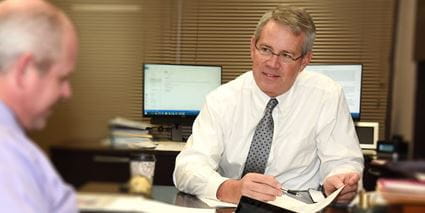 In 2023, the department recruited Asmaa Elkenawi, PharmD, as a translational researcher in prostate cancer. She recently received a large Department of Defense (DoD) grant to study racial disparities in immune function in prostate cancer. Other faculty have received NIH and DoD grants for research in areas including reconstructive surgery and improving outcomes in urologic cancers.
In 2023, the department recruited Asmaa Elkenawi, PharmD, as a translational researcher in prostate cancer. She recently received a large Department of Defense (DoD) grant to study racial disparities in immune function in prostate cancer. Other faculty have received NIH and DoD grants for research in areas including reconstructive surgery and improving outcomes in urologic cancers.
“Through his visionary leadership, Dr. Koch has cultivated a culture of collaboration and continuous learning, ensuring that the department remains at the forefront of medical research and education,” Misseri said. “His supportive nature and motivational approach have made a lasting impact on the professional growth and development of everyone under his mentorship.”
